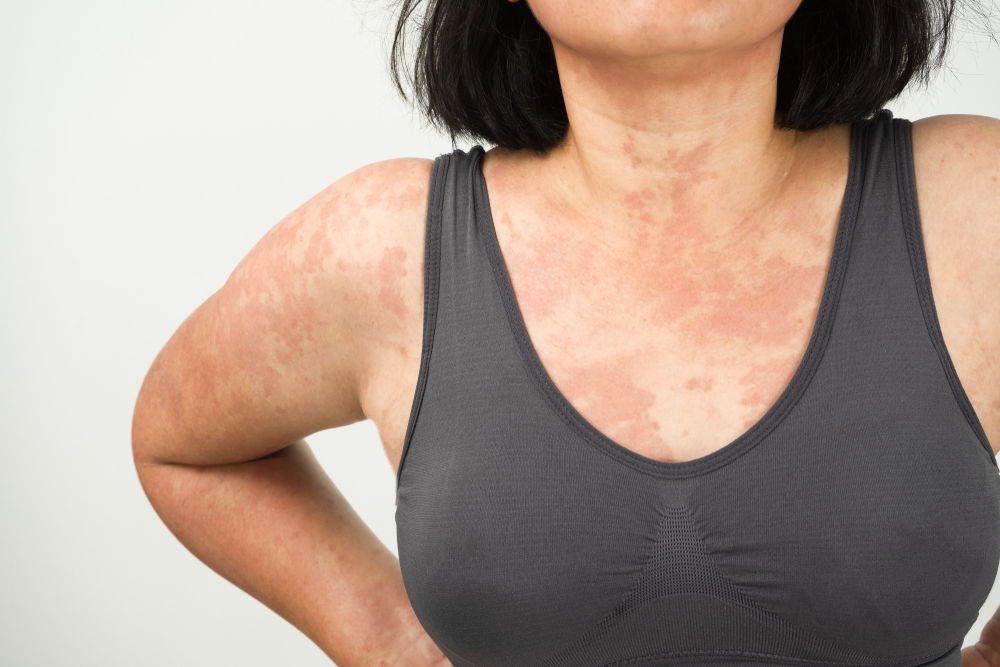
Anaphylaxis Treatment
Anaphylaxis is a severe, life-threatening allergic reaction that requires immediate emergency medical attention. It can occur within minutes of exposure to an allergen, but in some cases may develop over several hours. Symptoms include facial and throat swelling, hives, abdominal pain and cramping, difficulty breathing, dizziness, or loss of consciousness. In some cases, individuals may experience a biphasic reaction with symptoms returning after 24 hours or more after the initial reaction.
Treatment for anaphylaxis involves the use of epinephrine auto-injectors as well as other treatments depending on the severity of the reaction. Most patients require only a single dose of epinephrine to stop the progression of anaphylaxis; however, additional doses may be necessary and follow-up medical care should be sought out to ensure proper recovery. Anaphylaxis is an emergency and emergency medical help should be sought out immediately.
Types of Reactions
Severe Anaphylaxis
Severe anaphylaxis is a life-threatening reaction that requires immediate medical treatment. Symptoms can include hives, swelling, wheezing, shortness of breath, a hoarse voice, and feeling lightheaded or dizzy. If not treated quickly and properly, the patient may go into shock or even die.
Food Allergy
Food allergy is one of the most common causes of anaphylactic reactions. Common triggers include peanuts, tree nuts, shellfish, dairy products, and other food proteins. It is important to be aware of the signs and symptoms related to these allergies in order to respond quickly in case of an emergency.

Biphasic Anaphylaxis
Biphasic anaphylaxis occurs when a person experiences two waves of symptoms several hours apart after being exposed to an allergen such as food or insect sting venom. This second wave can be more severe than the first and must be taken seriously and monitored closely by medical professionals.
Treatment for Anaphylaxis
The most effective treatment for anaphylaxis is prompt administration of epinephrine (also known as adrenaline). This medication helps reduce the severity of symptoms when it is administered immediately after the onset of an allergic reaction. A systematic review has demonstrated that prompt use of epinephrine in cases of severe anaphylaxis can reduce mortality rates significantly compared to delayed use or no use at all.
Emergency Treatment
In cases where an individual has suffered from a severe allergic reaction or has had multiple episodes in the past, it is important for them to be prepared with proper medical supplies such as epinephrine autoinjectors (e.g., EpiPens) which are used to administer epinephrine if necessary. In addition, people with severe allergies should also consider wearing medical alert jewelry indicating their allergies so that emergency personnel will know how best to help them in case of a reaction.
Symptoms of Anaphylaxis

Anaphylaxis is a severe allergic reaction that requires quick medical treatment. To recognize anaphylaxis, it is important to be aware of the signs and symptoms associated with the condition. Symptoms can range from mild skin reactions such as hives or itching to more severe reactions including airway obstruction, respiratory distress, weak pulse, and shock. In severe cases, anaphylactic shock can lead to loss of consciousness and death if not treated immediately with a shot of epinephrine (adrenaline). People with known allergies or those who have had multiple episodes in the past should carry emergency medications such as epinephrine auto-injectors (EpiPens) for use in case of an allergic emergency. Recognizing anaphylaxis early and providing prompt treatment are essential for managing this potentially life-threatening condition. People with anaphylaxis should seek immediate medical attention at the nearest emergency facility for critical care management and further instructions on how to prevent future episodes. Allergy specialists can also provide advice on how best to manage anaphylaxis along with providing information about the prevention of food allergies through proper diagnosis and avoidance of triggers.
Causes of Anaphylaxis
Anaphylaxis is an acute and potentially life-threatening allergic reaction that can be triggered by a variety of allergens such as foods, drugs, insect stings, or latex. Reactions to food are the most common cause of anaphylaxis, with peanuts and tree nuts being some of the most frequent offenders. Ingesting even small amounts of food allergens can sometimes trigger severe reactions. Insect stings from bees, wasps, hornets, and other stinging insects can also cause anaphylaxis in susceptible individuals.
It is important for allergy practices to recognize this serious condition and provide guidance on how best to manage future reactions. This includes educating patients about their specific allergies and which triggers to avoid, as well as providing information about recognition of symptoms and prompt treatment with epinephrine auto-injectors (EpiPens) if necessary. It is also important to be aware of the possibility of a biphasic response in which a second wave of symptoms occurs several hours after initial exposure; this should be monitored closely by medical professionals if necessary. Proper diagnosis and management are essential for preventing life-threatening episodes in those who suffer from anaphylaxis.

Testing and Diagnosis of Anaphylaxis
The diagnosis of anaphylaxis is usually made by a healthcare provider based on the recognition of symptoms and risk factors. A complete medical history should be taken to identify any prior episodes of anaphylaxis. Physical examination may also be performed to assess for signs and symptoms such as hives, swelling, difficulty breathing, and low blood pressure. Furthermore, laboratory tests may be ordered to help determine if there is an underlying cause related to the reaction (e.g., elevated IgE levels). If necessary, skin testing can also be conducted to identify specific allergens that may have caused the reaction.
Management of anaphylaxis requires prompt recognition and treatment with epinephrine auto-injectors (EpiPens). Once administered, patients should seek immediate medical attention at the nearest emergency facility for further care and management. Allergy specialists can also provide advice on how best to manage future episodes along with providing information about prevention through proper diagnosis and avoidance of triggers. It is important for practices to recognize this condition in order to appropriately treat it in order to prevent life-threatening episodes in those who suffer from anaphylaxis.
Prevention Strategies for Anaphylaxis
Prevention strategies for anaphylaxis involve identifying and avoiding known allergens, carrying medication in case of an emergency, and being prepared to treat an anaphylactic episode should one occur.
The first-line treatment for anaphylaxis is the administration of epinephrine, which can be given intramuscularly or subcutaneously. This helps to reduce the symptoms by blocking histamine receptors and dilating blood vessels. It is important to recognize the signs of anaphylaxis as early as possible in order to avoid further complications or even death.
Emergency departments should always have epinephrine on hand in case of a severe allergic reaction. In addition, patients should also carry at least two doses of epinephrine with them at all times in case of a potential anaphylactic episode outside of medical care. Normal saline may also be used to rinse away any remaining allergen from skin or mucous membranes that could trigger another reaction if not removed promptly.
It is important for individuals who are at risk for developing anaphylaxis to receive proper training and education regarding prevention measures they can take in order to minimize their risks and be prepared should they experience a severe allergic reaction.
Schedule your consultation
Long-Term Management Strategies for Chronic Anaphylaxis
For those who suffer from chronic anaphylaxis, long-term management strategies should be developed in order to prevent future episodes and provide the best possible care. Healthcare providers should educate individuals on how to recognize the signs and symptoms of anaphylactic responses in order to seek prompt medical attention when necessary. It is also important for patients to avoid known allergens which can trigger anaphylaxis and carry medication such as epinephrine auto-injectors (EpiPens) for emergency use if necessary.
Patients with chronic allergies should also work closely with their healthcare providers in order to develop an individualized treatment plan. This may include recommendations on allergen avoidance, lifestyle modifications, or the use of medications such as antihistamines or corticosteroids in order to reduce allergy symptoms associated with their condition. In addition, regular follow-up visits with medical professionals are essential for monitoring progress and adjusting treatment accordingly if needed.
It is also important for healthcare providers to identify any comorbidities which could complicate the patient’s response to an allergic reaction. For example, those with asthma may have more severe reactions than those without this condition due to airway constriction that can occur during a reaction. Therefore, it is vital that these patients receive proper education and guidance regarding their diagnosis as well as long-term management strategies for the prevention of future episodes of anaphylaxis.

Pick one of our convenient locations
for your Anaphylaxis Treatment
Why Choose Our Specialists?
- Dr. Elias Akl, is a distinguished allergist and immunologist based in Philadelphia. He holds board certifications in Allergy and Immunology as well as Internal Medicine, showcasing his expertise in multiple medical disciplines. Dr. Akl is not only board-certified in internal medicine but also a Fellow of the American Academy of Allergy Asthma and Immunology (FAAAAI).
- Dr. Kathryn Edwards, Director of Allergy & Immunology at The Penn Medicine Becker ENT & Allergy Center, is a board-certified allergist and immunologist who specializes in the diagnosis and treatment of allergies, food allergies, skin conditions, and asthma. She is a highly trained physician with extensive experience in the military, where she served as a pediatrician and chief of Allergy/Immunology. Dr. Edwards provides care for patients of all ages, from neonates to geriatrics.
- Dr. Naba Sharif is a highly skilled board-certified Allergist and Immunologist with expertise in diagnosing and treating allergies, including environmental and seasonal allergies, food allergies, and asthma. She received her medical degree from SUNY at Stony Brook School of Medicine, completed a Pediatrics residency at Hasbro Children’s Hospital of Brown University, and pursued a fellowship in Allergy and Immunology at the North Shore-Long Island Jewish Health System. She practiced as a Pediatrician and Allergist-Immunologist at Kaiser Permanente in Washington DC, was recognized as a Top Doctor by Washingtonian Magazine from 2016 to 2020, and is a Fellow of the American Academy of Allergy, Asthma & Immunology and the American College of Allergy, Asthma & Immunology. Dr. Sharif is committed to community service, health education, empowerment, and advocacy for the underprivileged.
- Dr. Jamie Zacharias is a highly accomplished and board-certified Allergist and Immunologist hailing from South Jersey. She pursued her education in her hometown, graduating from Bishop Eustace Preparatory School, and furthered her academic journey by earning her bachelor’s and medical degrees from Drexel University and the College of Medicine in Philadelphia, PA. Dr. Zacharias continued her medical training with an Internal Medicine internship and residency at Drexel University College of Medicine/Hahnemann University Hospital. Following this, she completed a comprehensive Allergy and Immunology fellowship at Penn State Hershey Medical Center, where she actively engaged in asthma research, particularly focusing on patient demographics and phenotyping. Dr. Zacharias holds memberships in esteemed organizations such as the Pennsylvania Allergy and Asthma Association, the American Academy of Allergy, Asthma, and Immunology, and the American College of Allergy, Asthma, and Immunology. Her specialization encompasses the diagnosis and treatment of various conditions, including asthma, immunodeficiencies, seasonal and environmental allergies, allergic reactions (including drug and food allergies), and skin conditions such as hives and eczema. Dr. Zacharias is dedicated to providing care across a wide age spectrum, from pediatric to geriatric patients, and she is excited to contribute to the well-being of her community where she has deep roots.
Frequently Asked Questions About Anaphylaxis
In this section, we will address some common questions about anaphylaxis to provide you with a better understanding of this life-threatening condition.
